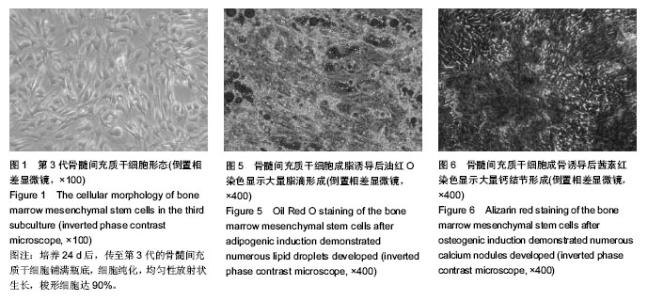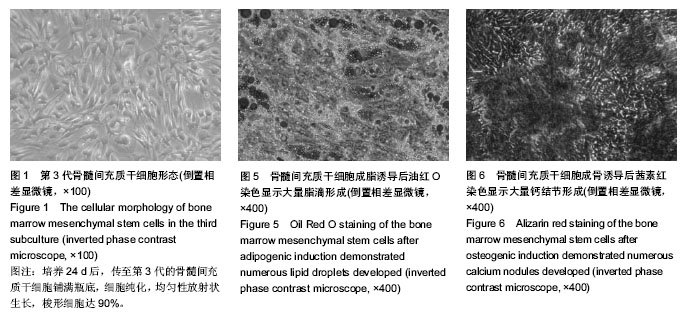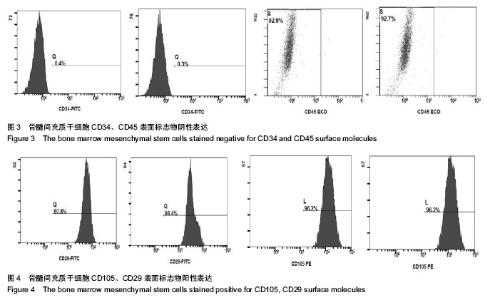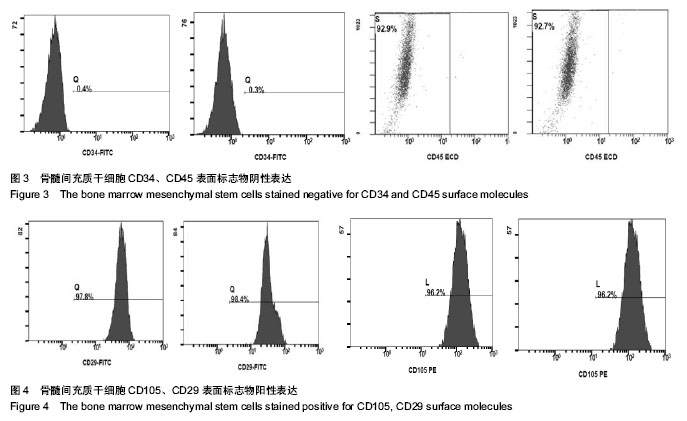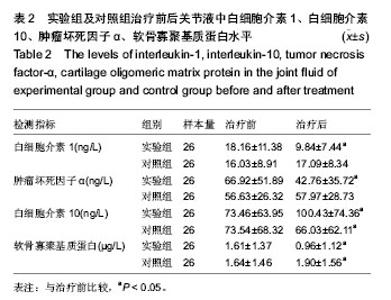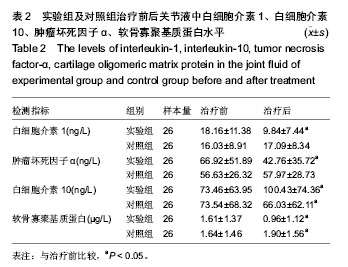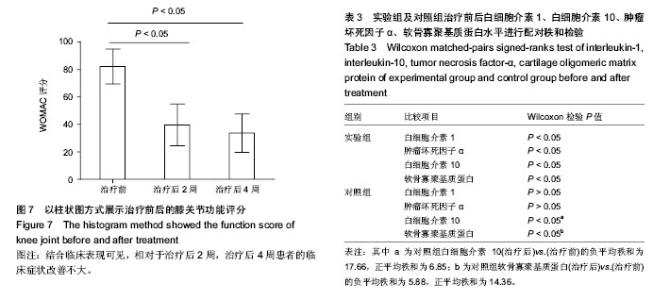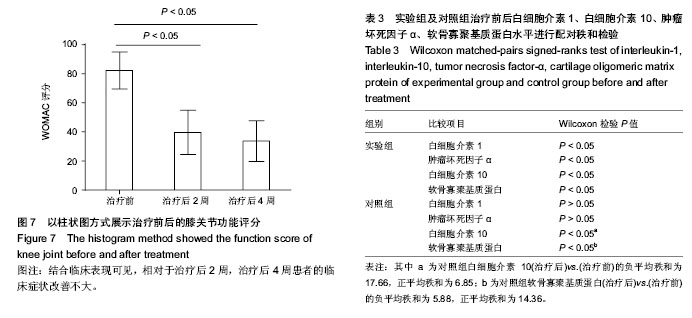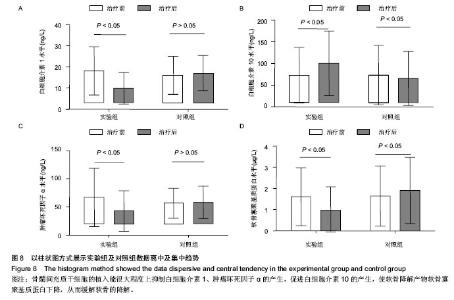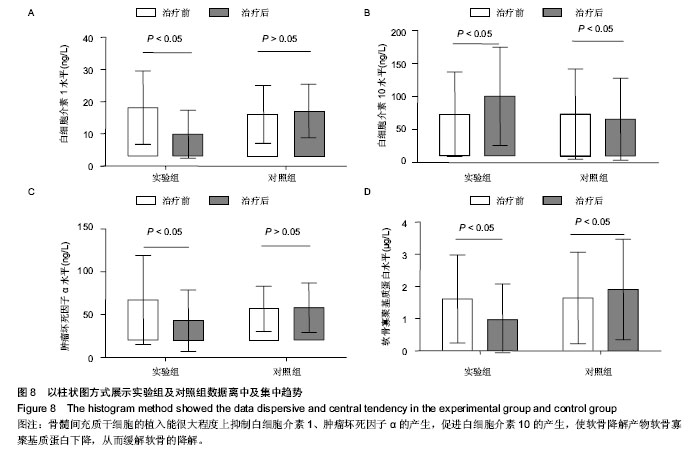Chinese Journal of Tissue Engineering Research ›› 2015, Vol. 19 ›› Issue (14): 2216-2223.doi: 10.3969/j.issn.2095-4344.2015.14.015
Previous Articles Next Articles
Intraarticular injection of autologous bone marrow mesenchymal stem cells for mild-to-moderate osteoarthritis
Liang Jian-ji, He Zhi-yong, Liu Kang, Li Xiao-ling, Cheng Wei-min, Yu Xin-ping, Chen Er-dong
- Zhongshan People’s Hospital, Zhongshan 528400, Guangdong Province, China
-
Revised:2015-03-16Online:2015-04-02Published:2015-04-02 -
About author:Liang Jian-ji, Master, Physician, Zhongshan People’s Hospital, Zhongshan 528400, Guangdong Province, China
CLC Number:
Cite this article
Liang Jian-ji, He Zhi-yong, Liu Kang, Li Xiao-ling, Cheng Wei-min, Yu Xin-ping, Chen Er-dong. Intraarticular injection of autologous bone marrow mesenchymal stem cells for mild-to-moderate osteoarthritis [J]. Chinese Journal of Tissue Engineering Research, 2015, 19(14): 2216-2223.
share this article
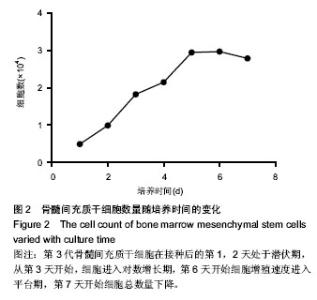
2.2 骨髓间充质干细胞的生长曲线 第3代骨髓间充质干细胞在接种后的第1,2天处于潜伏期,从第3天开始,细胞进入对数增长期,增殖活跃,呈指数级增长,此期持续约3 d。第6天开始细胞增殖速度进入平台期,第7天开始细胞总数量下降,见图2。 2.3 流式分析骨髓间充质干细胞表面标记物 取第3代骨髓间充质干细胞行流式细胞仪分析,可以观察到超过90%干细胞CD34、CD45表面标志物阴性,见图3。超过97%干细胞阳性表达CD29,超过96%干细胞阳性表达CD105,见图4。结果显示,骨性关节炎患者的细胞表面标志物表达情况与文献报道的一致[2]。 2.4 骨髓间充质干细胞体外诱导成脂及成骨能力鉴定 在成脂诱导液培养下,骨髓间充质干细胞向脂肪细胞分化,2周后,经油红O染色显示大量脂滴形成,见图5。在成骨诱导液培养下,骨髓间充质干细胞向成骨细胞分化,细胞融合,3周后经茜素红染色显示大量钙结节形成,见图6。骨髓间充质干细胞的体外诱导实验提示其具有多分化潜能,能成功向成骨细胞及脂肪细胞分化。"
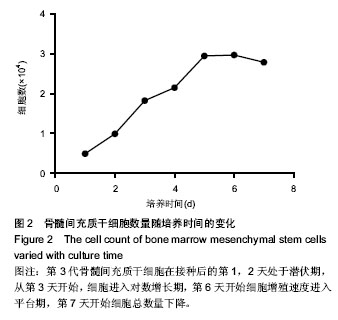
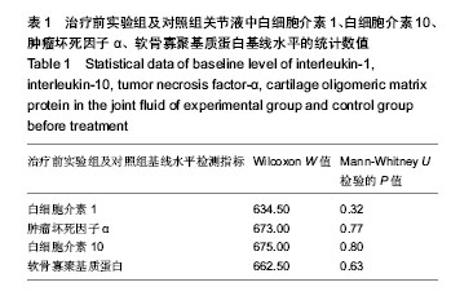
2.5 参与者数量分析 26例膝关节骨性关节炎患者均进入结果分析。 2.6 治疗前后患者膝关节功能变化的结果分析 治疗前、治疗后2周、治疗后4周膝关节的WOMAC评分数据的分布符合正态(正态性检验采用Shapiro-Wilk检验,设定检验水准α=0.1),采用x(_)±s进行数据描述,以配对t 检验进行比较。治疗后2,4周的膝关节功能评分[(39.62±15.27)分,(33.65±14.07)分]明显低于治疗前(82.27±12.76)分,差异有显著性意义(P < 0.05),见图7。治疗后2周膝关节功能评分与治疗后4周比较,差异无显著性意义,结合临床表现可见,相对于治疗后2周,治疗后4周患者的临床症状改善不大。 2.7 实验组及对照组治疗前后关节液中白细胞介素1、白细胞介素10、软骨寡聚基质蛋白、肿瘤坏死因子α水平变化 治疗前,对实验组及对照组白细胞介素1、肿瘤坏死因子α、白细胞介素10、软骨寡聚基质蛋白资料基线水平进行了比较,因各独立样品资料不符合正态分布,故分别采用两独立样本的Mann-Whitney U检验,设定检验水准 P=0.05,得出各组资料的统计结果差异无显著性意义(P > 0.05),见表1,治疗前实验组及对照基线水平一致,故具有可比性。统计分析显示治疗前后白细胞介素1、肿瘤坏死因子α、白细胞介素10、软骨寡聚基质蛋白的差值分布不符合正态分布,采用配对资料的秩和检验。实验组经皮膝关节注射自体骨髓间充质干细胞2周后,关节液中白细胞介素1、肿瘤坏死因子α和软骨寡聚基质蛋白明显下降,白细胞介素10明显升高,实验组治疗前后的白细胞介素1、肿瘤坏死因子α、白细胞介素10、软骨寡聚基质蛋白资料经统计,差异均有显著性意义(P < 0.05);对照组治疗前后白细胞介素1、肿瘤坏死因子α资料经统计发现差异无显著性意义(P > 0.05),而白细胞介素10及软骨寡聚基质蛋白资料经统计发现差异有显著性意义(P < 0.05),见图8和表2。通过比较正负平均秩和得出对照组治疗后白细胞介素10平均水平降低,软骨寡聚基质蛋白平均水平升高,见表3。说明骨髓间充质干细胞的植入能很大程度上抑制炎症因子白细胞介素1、肿瘤坏死因子α的产生,促进抗炎症因子白细胞介素10的产生,使软骨降解产物软骨寡聚基质蛋白下降,从而缓解软骨的降解。 2.8 不良反应 注射骨髓间充质干细胞过程中未发生发热、感染、软骨软化等不良反应。"
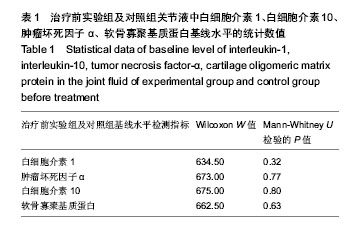
| [1] Kellgren JH, Lawrence JS. Radiological assessment of rheumatoid arthritis. Ann Rheum Dis. 1957;16(4):485-493.
[2] Mareddy S, Crawford R, Brooke G, et al. Clonal isolation and characterization of bone marrow stromal cells from patients with osteoarthritis. Tissue Eng. 2007;13(4):819-829.
[3] Madry H, Cucchiarini M. Clinical potential and challenges of using genetically modified cells for articular cartilage repair. Croat Med J. 2011;52(3):245-261.
[4] Evans CH, Robbins PD, Ghivizzani SC, et al. Gene transfer to human joints: progress toward a gene therapy of arthritis. Proc Natl Acad Sci U S A. 2005;102(24):8698-8703.
[5] Centeno CJ, Busse D, Kisiday J, et al. Increased knee cartilage volume in degenerative joint disease using percutaneously implanted, autologous mesenchymal stem cells. Pain Physician. 2008;11(3):343-353.
[6] Emadedin M, Aghdami N, Taghiyar L, et al. Intra-articular injection of autologous mesenchymal stem cells in six patients with knee osteoarthritis. Arch Iran Med. 2012;15(7):422-428.
[7] Vangsness CT Jr, Farr J 2nd, Boyd J, et al. Adult human mesenchymal stem cells delivered via intra-articular injection to the knee following partial medial meniscectomy: a randomized, double-blind, controlled study. J Bone Joint Surg Am. 2014;96(2):90-98.
[8] Krampera M, Cosmi L, Angeli R, et al. Role for interferon-gamma in the immunomodulatory activity of human bone marrow mesenchymal stem cells. Stem Cells. 2006; 24(2): 386-398.
[9] Liang C, Chen SL, Wang M, et al. Synergistic immunomodulatory effects of interferon-gamma and bone marrow mesenchymal stem cells. Zhonghua Xue Ye Xue Za Zhi. 2013;34(3):213-216.
[10] Ren G, Zhang L, Zhao X, et al. Mesenchymal stem cell-mediated immunosuppression occurs via concerted action of chemokines and nitric oxide. Cell Stem Cell. 2008; 2(2):141-150.
[11] Ghannam S, Bouffi C, Djouad F, et al. Immunosuppression by mesenchymal stem cells: mechanisms and clinical applications. Stem Cell Res Ther. 2010;1(1):2.
[12] Wang M, Shen J, Jin H, et al. Recent progress in understanding molecular mechanisms of cartilage degeneration during osteoarthritis. Ann N Y Acad Sci. 2011; 1240:61-69.
[13] Németh K, Leelahavanichkul A, Yuen PS, et al. Bone marrow stromal cells attenuate sepsis via prostaglandin E(2)-dependent reprogramming of host macrophages to increase their interleukin-10 production. Nat Med. 2009;15(1): 42-49.
[14] Spaggiari GM, Abdelrazik H, Becchetti F, et al. MSCs inhibit monocyte-derived DC maturation and function by selectively interfering with the generation of immature DCs: central role of MSC-derived prostaglandin E2. Blood. 2009;113(26):6576- 6583.
[15] Sitcheran R, Cogswell PC, Baldwin AS Jr. NF-kappaB mediates inhibition of mesenchymal cell differentiation through a posttranscriptional gene silencing mechanism. Genes Dev. 2003;17(19):2368-2373.
[16] Murakami S, Lefebvre V, de Crombrugghe B. Potent inhibition of the master chondrogenic factor Sox9 gene by interleukin-1 and tumor necrosis factor-alpha. J Biol Chem. 2000;275(5): 3687-3692.
[17] Garnero P, Rousseau JC, Delmas PD. Molecular basis and clinical use of biochemical markers of bone, cartilage, and synovium in joint diseases. Arthritis Rheum. 2000;43(5):953- 968.
[18] Halász K, Kassner A, Mörgelin M, et al. COMP acts as a catalyst in collagen fibrillogenesis. J Biol Chem. 2007;282(43): 31166-31173.
[19] 王晓滨,薛庆云.骨关节炎患者滑液中COMP水平与病情严重程度的相关性研究[J].中国骨与关节外科, 2012,5(1):60-64.
[20] Horie M, Sekiya I, Muneta T, et al. Intra-articular Injected synovial stem cells differentiate into meniscal cells directly and promote meniscal regeneration without mobilization to distant organs in rat massive meniscal defect. Stem Cells. 2009;27(4):878-887.
[21] Horie M, Choi H, Lee RH, et al. Intra-articular injection of human mesenchymal stem cells (MSCs) promote rat meniscal regeneration by being activated to express Indian hedgehog that enhances expression of type II collagen. Osteoarthritis Cartilage. 2012;20(10):1197-1207.
[22] Rubio D, Garcia-Castro J, Martín MC, et al. Spontaneous human adult stem cell transformation. Cancer Res. 2005; 65(8):3035-3039.
[23] Bernardo ME, Zaffaroni N, Novara F, et al. Human bone marrow derived mesenchymal stem cells do not undergo transformation after long-term in vitro culture and do not exhibit telomere maintenance mechanisms. Cancer Res. 2007;67(19):9142-9149.
[24] In 't Anker PS, Scherjon SA, Kleijburg-van der Keur C, et al. Isolation of mesenchymal stem cells of fetal or maternal origin from human placenta. Stem Cells. 2004;22(7):1338-1345.
[25] Wang S, Qu X, Zhao RC. Clinical applications of mesenchymal stem cells. J Hematol Oncol. 2012;5:19.
[26] Jo CH, Lee YG, Shin WH, et al. Intra-articular injection of mesenchymal stem cells for the treatment of osteoarthritis of the knee: a proof-of-concept clinical trial. Stem Cells. 2014; 32(5):1254-1266. |
| [1] | Lin Han-wen, Wen Jun-mao, Huang Chao-yuan, Zhou Chi, Tang Hong-yu. Correlation between the changes in lower limb power line and pain area in the knee osteoarthritis patients: imaging evaluation [J]. Chinese Journal of Tissue Engineering Research, 2017, 21(7): 1110-1114. |
| [2] | Chen Jin-dong, Xu Xin, Sun Dong-hong, Min Cui-xia, Chen Yang, Liu Xiu-mei . Difference in periprosthetic acetabular bone mineral density between osteonecrosis and osteoarthritis patients after primary total hip arthroplasty [J]. Chinese Journal of Tissue Engineering Research, 2016, 20(39): 5788-5793. |
| [3] | Lu Ning, Yang Yang. Unicompartmental knee replacement for medial compartmental knee osteoarthritis: a four to six-year follow-up [J]. Chinese Journal of Tissue Engineering Research, 2016, 20(31): 4575-4581. |
| [4] | Liu Peng, Liu Ping-ping. A comparison of computer-assisted total knee arthroplasty through vastus medialis approach and conventional arthroplasty [J]. Chinese Journal of Tissue Engineering Research, 2016, 20(22): 3205-3211. |
| [5] | Ren Zhi-shuai, Cheng Zhao-jun, Sun He-jun, Sun Zhen-hui, Cui Zi-jian, Zhang Li-long, Lin Yong-zhi, Zhang Ren-zan, Peng Bing, Zhang Xue-li. Osteoporosis-related factors in patients with knee osteoarthritis before total knee arthroplasty [J]. Chinese Journal of Tissue Engineering Research, 2016, 20(22): 3212-3218. |
| [6] | Zhou Chang-yan, Zhou Qing-huan, Bian Jing, Chen Ke, Chen Wen. Bone marrow mesenchymal stem cells combined with calcium phosphate cement to repair articular cartilage defects in rabbits [J]. Chinese Journal of Tissue Engineering Research, 2015, 19(8): 1195-1199. |
| [7] | Zhang Sheng-hai, Fu Li-ming, Ma Zhao-ji, Jiang Guo-wang. Evaluation and influencing factors of knee function in aged patients with osteoarthritis before and after total knee arthroplasty [J]. Chinese Journal of Tissue Engineering Research, 2015, 19(4): 499-503. |
| [8] | Xu Peng-fei, Yin Zong-sheng, Gao Wei-lu, Ma Zhi-xiang. Epidemiology of total knee arthroplasty: a retrospective analysis among 1 146 cases in Hefei City from 2008 to 2013 [J]. Chinese Journal of Tissue Engineering Research, 2015, 19(4): 504-509. |
| [9] | Jing Cai-xia, Liu Chang-kui, Tan Xin-ying, Luo Jin-chao, Hu Min. Bone mesenchymal stem cells with allogeneic bone to repair canine mandibular defects: detection of osteogenic ability [J]. Chinese Journal of Tissue Engineering Research, 2015, 19(14): 2138-2143. |
| [10] | Xu Xiang, Yin He-ping. Platelet-rich plasma accelerates the proliferation of bone marrow mesenchymal stem cells [J]. Chinese Journal of Tissue Engineering Research, 2015, 19(14): 2144-2148. |
| [11] | Lv Pin-lei, Su Yue-han, Cao Yun, Wang Zheng. Treatment of osteoarthritis using colony-forming cells in stromal vascular fraction of adipose tissue [J]. Chinese Journal of Tissue Engineering Research, 2015, 19(14): 2149-2154. |
| [12] | Ruan Guang-ping, Yao Xiang, Liu Ju-fen, Wang Jin-xiang, Hu Yuan-yuan, Li Zi-an, Yang Jian-yong, Pang Rong-qing, Pan Xing-hua. Transplantation of human umbilical cord mesenchymal stem cells in the treatment of systemic lupus erythematosus [J]. Chinese Journal of Tissue Engineering Research, 2015, 19(14): 2172-2178. |
| [13] | Jiang Yan-jie, Mao Cheng-gang, Ning Xian-feng, Li Rong, Li Zi-pu. Human umbilical cord mesenchymal stem cells via intramuscular injection influence the expression of cytokines related to dilated cardiomyopathy in rats [J]. Chinese Journal of Tissue Engineering Research, 2015, 19(14): 2179-2185. |
| [14] |
Liu Yu-liang, Li Jun, He Yu-qin, Zhuo Feng, Wei Kai-bin.
Transplantation of human umbilical cord derived-mesenchymal stem cells by different ways for the treatment of spinal cord injury
|
| [15] | Zhao Xiao-jian, Lu Cai-ping, Chu Wei-wei, Zhang Ya-xiao, Zhang Bing, Zhen Qiang, Tan Guo-liang, Wang Ren-feng, Liu Jia-bao, Wu Lin. Bone marrow mesenchymal stem cell transplantation for treatment of emphysema: intravenous versus intratracheal approach [J]. Chinese Journal of Tissue Engineering Research, 2015, 19(14): 2211-2215. |
| Viewed | ||||||
|
Full text |
|
|||||
|
Abstract |
|
|||||
